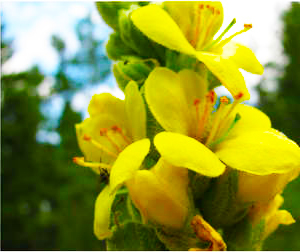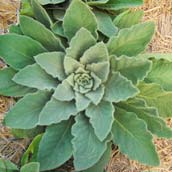Herbal Spotlight: Mullein
by Shannon Joyner, Editor

IMAGE CREDITS:herbalremediesadvice.org
With an unprecedented climate-change-driven wildfire season, we at Ecology Action— along with the entire west coast of the United States—have been enduring smoke so thick it turned day into night, and gave us the dubious honor of having the worst air quality in the world. The fires will not stop until the rains arrive, so to help our lungs cope with the extra load, we turn to our herbal allies for assistance.
There are many herbs and spices that can help cleanse, soothe and heal the lungs: turmeric, ginger, tulsi, mallow, comfrey and many others are recommended by professional herbalists. But one stands out as the primary herb that seems to be recommended by everyone coping with wildfire smoke: Mullein.
 Native to Europe, Africa and Asia, Mullein (Verbascum Thapsus) came to the Americas with immigrants and quickly naturalized here to the point that some consider it a weed. A dramatic plant, growing in a rosette of very large silvery gray fuzzy leaves, Mullein sprouts a towering stalk of yellow flowers the second year, providing a beautiful addition to any garden. It is drought-resistant and deer-resistant, and is easy to grow, taking to any well-drained soil, even dry and rocky areas. Note that it is a hyperaccumulator of heavy metals, so be careful to source your Mullein from a reputable grower, and don't plant or harvest it where you know the soil is polluted. Native to Europe, Africa and Asia, Mullein (Verbascum Thapsus) came to the Americas with immigrants and quickly naturalized here to the point that some consider it a weed. A dramatic plant, growing in a rosette of very large silvery gray fuzzy leaves, Mullein sprouts a towering stalk of yellow flowers the second year, providing a beautiful addition to any garden. It is drought-resistant and deer-resistant, and is easy to grow, taking to any well-drained soil, even dry and rocky areas. Note that it is a hyperaccumulator of heavy metals, so be careful to source your Mullein from a reputable grower, and don't plant or harvest it where you know the soil is polluted.
Greek physician, pharmacologist, botanist, and author Dioscorides first described Mullein being used to treat pulmonary diseases 2000 years ago, and the flowers, leaves, and root of Mullein have been used as folk healing remedies wherever it grows for centuries. Mullein leaf and flower were listed as an official medicine in the United States National Formulary from 1916 to 1936, and Mullein is approved by the German advisory panel for herbal medicine, for treatment of respiratory catarrh. Studies have confirmed the anti-inflammatory action of Mullein. Mullein tea, made from the flowers and leaf, is a beneficial remedy for bronchitis, sore throat, tonsillitis, dry coughs, and hoarseness.
Registered Herbalist Rosalee says of Mullein: “It is a mild relaxant to the lungs and also a mild demulcent. It soothes inflammation and dryness—often the causes of irritation for people with smoke exposure. In addition to the leaf, mullein flowers can have an added benefit to these dry irritated conditions. I often combine it with another demulcent such as mallow (Malva neglecta) or marshmallow (Althaea officinalis). Mullein leaves are almost always in my smokey-sky tea blends.” She provides a lot more information about Mullein and other helpful herbs for mitigating the pollution and stress of wildfire, including the following recipe for a lung-soothing tea (along with two additional recipes for teas to support the heart and nerves at www.herbalremediesadvice.org/herbs-for-wildfire-smoke.html):
Rosalee's Relax and Restore the Lungs Tea
1/2 cup (10 grams) finely crumbled dried mullein leaves
1/8 cup (4 grams) finely crumbled dried plantain leaves
1/8 cup (4 grams) finely crumbled dried mallow leaves
1 T dried hibiscus
2 tsp dried mint
1. Place all of the ingredients in a quart jar (or quart-sized tea press). Pour just-boiled water over the herbs, stir well, and then cover. Infuse for 30 minutes or as long as overnight.
2. Strain well through a coffee filter or a couple layers of cheesecloth to avoid the small irritating hairs on the Mullein leaves. Drink within 24 hours.
top | Newsletter Home |Table of Contents| Archive

|



 Native to Europe, Africa and Asia, Mullein (Verbascum Thapsus) came to the Americas with immigrants and quickly naturalized here to the point that some consider it a weed. A dramatic plant, growing in a rosette of very large silvery gray fuzzy leaves, Mullein sprouts a towering stalk of yellow flowers the second year, providing a beautiful addition to any garden. It is drought-resistant and deer-resistant, and is easy to grow, taking to any well-drained soil, even dry and rocky areas. Note that it is a hyperaccumulator of heavy metals, so be careful to source your Mullein from a reputable grower, and don't plant or harvest it where you know the soil is polluted.
Native to Europe, Africa and Asia, Mullein (Verbascum Thapsus) came to the Americas with immigrants and quickly naturalized here to the point that some consider it a weed. A dramatic plant, growing in a rosette of very large silvery gray fuzzy leaves, Mullein sprouts a towering stalk of yellow flowers the second year, providing a beautiful addition to any garden. It is drought-resistant and deer-resistant, and is easy to grow, taking to any well-drained soil, even dry and rocky areas. Note that it is a hyperaccumulator of heavy metals, so be careful to source your Mullein from a reputable grower, and don't plant or harvest it where you know the soil is polluted. 